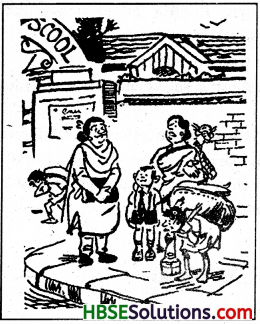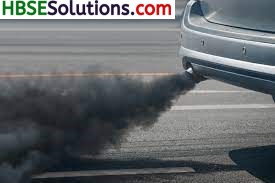Haryana State Board HBSE 8th Class Social Science Solutions Civics Chapter 10 Law and Social Justice Textbook Exercise Questions and Answers.
Haryana Board 8th Class Social Science Solutions Civics Chapter 10 Law and Social Justice
HBSE 8th Class Civics Law and Social Justice Textbook Questions and Answers
Class 8 Civics Chapter 10 HBSE Question 1.
Talk to two workers (for example, construction workers, farm workers, factory workers, workers at any shop) to find out if they are receiving the minimum wages laid down by law.
Answer:
(i) Farm workers are not getting minimum wages in villages.
(ii) Women workers are not getting equal wages as that of men which is not permitted by law.
Law And Social Justice Class 8 HBSE Question 2.
What are the advantages to foreign companies in setting up production in India?
Answer:
(i) They get cheap labourers or workers in India.
(ii) Since India has the second largest population country, there is a very vast internal market of foreign goods available in India.
(iii) India’s geographical conditions are favourable. India is linked to many other countries of the world. The companies, can export their goods to major markets of the world.
Law And Social Justice Class 8 Questions And Answers HBSE Question 3.
Do you think the victims of the Bhopal gas tragedy got justice?
Answer:
The victims of Bhopal Gas Tragedy have not got justice even after 28 years of Bhopal Gas Tragedy on December 2,1984. Even today 50,000 people are too sick to work. Many of them have developed severe respiratory disorders, eye-problems and other disorders. Even today many factories, workshops mines are running wihout proper safety measures.
![]()
Question 4.
What do we mean when we speak of law enforcement? Who is responsible for enforcement? Why is enforcement so important?
Answer:
(i) Meaning: Law enforcement means that the law maker and enforcer, the government ensures that safety laws are duly implemented.
(ii) The government (excutive) is responsible for enforcement of law.
(iii) The enforcement of law is so important that without enforcement, the framing of laws meaningless. Safety laws were not enforced that led to Bhopal Gas Tragedy.
Question 5.
How can laws ensure that markets work in a manner that is fair? Give two examples to support your answer.
Answer:
(i) Laws should ensure that business men use ISI marked balance, weights or measurements.
(ii) The products especially the medicines and eatables should have MRP (Maximum Retail Price) and expiry date marked on them.
It is through laws that the markets are regulated and the relation between workers, consumers and producers are not allowed to become explosive.
Question 6.
Imagine yourself to be a worker working in a chemical factory, which has received orders from the government to move to a different site 100 km away from the present location. Write about how your life would change.
Answer:
(a) I will have to shift my family.
(b) I will have to give ‘change of address’ notice for my bank and other legal documents.
(c) I will have to change the school of my children. If they don’t get a good school, their studies will suffer.
Question 7.
Write a paragraph on the various roles of the government that you have read ah opt in this unit.
Answer:
(i) The legislative organ of the government makes laws.
(ii) The executive organ of the government implements these laws and enforcement of the laws safeguards the interests of the minorities.
(iii) The judiciary organ of the government decides punishment for the law breakers.
(iv) The government ensures that the social- justice is achieved in the society, for example Workers do not work below minimumwages ; Child-labour is not practised.
(v) The government also undertakes welfare functions and sees to it that basic needs of the . citizens are met.
Question 8.
What are the source of environment pollution in your area? Discuss with respect to: (a) air (6) water (c) soil. What are the steps being taken to reduce the pollution. Can you suggest some other measures?
Answer:
(i) The sources of environment pollution in our area are:
(a) Air is being polluted from smoke coming from factories, chimneys.
(b) Smoke from petrol and diesel vehicles also pollute the air.
(c) Water-pollution is caused by dirt, chemical fertilizers and garbage from factories, farms and houses.
(d) Humans wastes, and dirt from factories pollute the soil.
(ii) The steps taken to reduce pollution are:
(a) New laws are being made to check the environment pollution.
(b) CNG vehicles are promoted which do not cause pollution.
(c) Actions are being taken against companies who are responsible to violate environment laws.
(iii) Other suggestions:
Laws alone cannot make the environment clean. It is the people and every individual who is responsible and should take voluntary actions to
minimise pollution.
Question 9.
How was environment treated earlier? What has been the change in perception? Discuss.
Answer:
(i) Earlier, the environment was considered a free entity which anyone could spoil. There was hardly any law to protect the environment. Neither the people, nor the government could take any action.
(ii) The Bhopal Gas Tragedy has brought the issue of environment to the forefront. Indian Government has introduced laws to protect the environment. The courts have declared the environment to be a public facility and the government is responsible for checking pollution, clear rivers and punish the wrong doers.
![]()
Question 10.
What do you think the famous Cartoonist R.K. Laxman is trying to convey in this cartoon? How does it relate to the 2006 law that you read on page 125.

Answer:
(i) I think the famous cartoonist is trying to draw our attention towards child-labour. In the cartoon, a rich woman hires another child to lessen the burden of heavy school-bag on her child’s shoulders.
(ii) The law of 2006, is an amendment to the Child Labour and Prevention Act, which bans children under 14 years of age from working as domestic servants or as workers in dhabas, restaurants, tea-shops etc.
Question 11.
You have read about the Bhopal gas tragedy and the on-going struggle. Students from countries across the world have come together to support this struggle for justice. From protest marches to awareness campaigns, you can read about their activities on the website www.studentsforbhopal.com. The website also has resources such as photos, posters, documentaries, victims’ statements, etc.
Use this and other sources to make a wallpaper/exhibition on the’ Bhopal tragedy for your classroom. Invite the whole school to see and talk about it.
Answer:
It is a classroom activity. Do yourself
HBSE 8th Class Civics Law and Social Justice Important Questions and Answers
Very Short Answer Type Questions
Question 1.
Why are law made to protect the interest of producers and consumers in the market?
Answer:
To ensure that the relations between the workers, consumer and producer are governed in a manner that is not exploitative.
Question 2.
Mention the health problems faced by the survivors of Bhopal Gas Tragedy.
Answer:
Many people developed severe respiratory disorders, eye problems and other disorders. Children developed peculiar abnormalities.
Question 3.
Why did Bhopal Gas Tragedy occur?
Answer:
Bhopal Gas Tragedy occurred due to leakage of highly poisonous gas-methyl isocyanite (MIC) from a factory which produces pesticides.
![]()
Short Answer Type Questions
Question 1.
How does the government ensure social justice?
Answer:
Through making, enforcing and upholding these laws the government control the activities of individuals or private companies to ensure social justice.
Question 2.
Which three states have developed plans to rescue and rehabilitate children who are working as domestic servants?
Answer:
Maharashtra, Karnataka and Tamil Nadu have developed plans to rescue and rehabilitate children who are working as domestic servants.
Question 3.
Was Bhopal Gas Tragedy an accident? If not why?
Answer:
Bhopal Gas Tragedy was not an accident Union Carbide had deliberately ignored the essential safety measures in order to cut costs. Much before the Bhopal disaster, there had been incidents of gas leakage killing a worker and injuring several people.
Long Answer Type Questions
Question 1.
Describe the Bhopal Gas Tragedy and the havoc caused by it.
Answer:
Union Carbide was an American Company located in Bhopal city in Madhya Pradesh where it produced pesticides. On December 2, 1884, a poisonous gas-Methyl-Isocyanite started leaking from this plant. The gas took no time to spread and the people settled in nearby areas started having breathing problems with in three days more than 8000 people died and hundreds of thousands were suffering different diseases. The people who survived developed many problems like respiratory problems, eye problems and other disorders. People became too sick and handicapped to work.
The tragedy occurred due to:
(i) Ignoring safety measures in order to cut costs.
(ii) Relaxation in enforcement of laws.
To make the matters worse; only 470 million was given as compensation as against 3 billion demanded by the court.
Picture-Based Questions
(A) Look at the given picutres and answer the following questions:

Question 1.
What is the major cause of environmental pollution?
Answer:
Emissions from vehicles are a major cause of environmental pollution.
![]()
Question 2.
What had the Supreme Court ordered in a series of rulings (1998 onwards)?
Answer:
The Supreme Court had ordered in a series of rulings (1998) that all public transport vehicles were to switch to Compressed Natural Gas (CNG).
Question 3.
Why are the high levels of toxic substances present in the air?
Answer:
The high levels of toxic substances are present in the air due to emissions from cars run on diesel and a sharp increase in the number of cars on the road.
Law and Social Justice Class 8 HBSE Notes
- Consumer: An individual who buys goods for personal use and not for resale.
- Producer: A person or organisation that produces goods for sale in the market. At times, the producer keeps a part of the produce for his own use, like a farmer.
- Investment: Money spent to purchase new machinery or buildings or training so as to be able to increase/modernise production in the future.
- Workers’ Union: An association of workers. Workers’ unions are common in factories and offices, but might be also found among other types of workers, say domestic workers’ union.
- Market: Bazar or market is that place where the process of buying selling of articles take place.
- Protective Laws: The laws which are framed or passed by the legislature to protect people from different types of exploitation. These laws try to ensure that the unfair practices are kept at a minirmiman the markets.